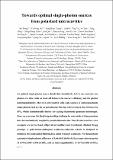Towards optimal single-photon sources from polarized microcavities
Abstract
An optimal single-photon source should deterministically deliver one, and only one, photon at a time, with no trade-off between the source’s efficiency and the photon indistinguishability. However, all reported solid-state sources of indistinguishable single photons had to rely on polarization filtering, which reduced the efficiency by 50%, fundamentally limiting the scaling of photonic quantum technologies. Here, we overcome this long-standing challenge by coherently driving quantum dots deterministically coupled to polarization-selective Purcell microcavities. We present two examples: narrowband, elliptical micropillars and broadband, elliptical Bragg gratings. A polarization-orthogonal excitation–collection scheme is designed to minimize the polarization filtering loss under resonant excitation. We demonstrate a polarized single-photon efficiency of 0.60 ± 0.02 (0.56 ± 0.02), a single-photon purity of 0.975 ± 0.005 (0.991 ± 0.003) and an indistinguishability of 0.975 ± 0.006 (0.951 ± 0.005) for the micropillar (Bragg grating) device. Our work provides promising solutions for truly optimal single-photon sources combining near-unity indistinguishability and near-unity system efficiency simultaneously.
Citation
Wang , H , He , Y-M , Chung , T-H , Hu , H , Yu , Y , Chen , S , Ding , X , Chen , M-C , Qin , J , Yang , X , Liu , R-Z , Duan , Z-C , Li , J-P , Gerhardt , S , Winkler , K , Jurkat , J , Wang , L-J , Gregersen , N , Huo , Y-H , Dai , Q , Yu , S , Höfling , S , Lu , C-Y & Pan , J-W 2019 , ' Towards optimal single-photon sources from polarized microcavities ' , Nature Photonics . https://doi.org/10.1038/s41566-019-0494-3
Publication
Nature Photonics
Status
Peer reviewed
ISSN
1749-4885Type
Journal article
Collections
Items in the St Andrews Research Repository are protected by copyright, with all rights reserved, unless otherwise indicated.

